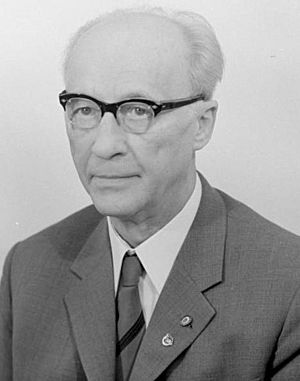Johannes Dieckmann facts for kids
Quick facts for kids
Johannes Dieckmann
|
|
|---|---|

Dieckmann in July 1967
|
|
| President of the Volkskammer | |
| In office 7 October 1949 – 22 February 1969 |
|
| Preceded by | Office created |
| Succeeded by | Gerald Götting |
| Deputy Chairman of the State Council | |
| In office 12 September 1960 – 22 February 1969 |
|
| Acting President of the German Democratic Republic | |
| In office 7 October 1949 – 11 October 1949 |
|
| Preceded by | Office established |
| Succeeded by | Wilhelm Pieck |
| In office 7 September 1960 – 12 September 1960 |
|
| Preceded by | Wilhelm Pieck |
| Succeeded by | Office abolished Walter Ulbricht (as Chairman of the State Council) |
| Personal details | |
| Born | 19 January 1893 Fischerhude, Hanover, German Empire |
| Died | 22 February 1969 (aged 76) East Berlin, East Germany |
| Political party | Liberal Democratic Party of Germany |
| Profession | Politician |
| Military service | |
| Allegiance | |
| Battles/wars | World War I Battle of France |
Johannes Dieckmann (born January 19, 1893 – died February 22, 1969) was an important German journalist and politician. He served as the first acting president of the parliament in East Germany from 1949 until 1969.
Contents
Early Life and Education
Dieckmann was born in Fischerhude, a town in what was then the Prussian Province of Hanover. His father was a Protestant pastor, a type of Christian minister. Johannes studied economics and philosophy at several universities in Germany. While studying, he joined a student group called the Verein Deutscher Studenten.
Military Service and Early Politics
In 1916, Dieckmann joined the German Army and fought in World War I. He was injured during the war. After the war, during the German Revolution of 1918–19, he became a leader in a soldiers' council.
After the war, he joined the German People's Party (DVP), a liberal political party. He worked closely with Gustav Stresemann, a famous German politician. Dieckmann became a party secretary and later a member of the Landtag of Saxony, which was the state parliament of Saxony.
During the Nazi Era
When the Nazis took power in 1933, Dieckmann lost his political job. He then worked in fuel and oil companies. He was called back to the army for a short time during World War II and took part in the French campaign. Later, he worked in industrial businesses. After a failed attempt to overthrow Hitler, Dieckmann was watched carefully by the Gestapo, the Nazi secret police.
Post-War Career in East Germany
After World War II, Dieckmann helped start a newspaper called Sächsisches Tageblatt. In October 1945, he also co-founded the Kulturbund, a cultural organization.
Founding the Liberal Democratic Party
In 1945, Dieckmann was one of the people who helped create the Demokratische Partei Deutschlands. This party was later renamed the Liberal-Demokratische Partei Deutschlands (LDPD). He remained a key member of the party's leadership.
From 1946 to 1952, Dieckmann was a member of the Saxon Landtag (state parliament) for the LDPD. He helped guide his party to join the National Front of the GDR. The National Front was a group of official political and social organizations in East Germany. It was mainly controlled by the Socialist Unity Party of Germany, which was the leading communist party. From 1950 onwards, Dieckmann was also a member of the National Front's leadership.
Key Roles in Government
From 1948 to 1949, Dieckmann served as the Minister of Justice for the state of Saxony. He was also the deputy Ministerpräsident (deputy prime minister) of Saxony. In 1948 and 1949, he was a member of the German Economic Commission and the German People's Council.
He became the president, or chairman, of the provisional People's Chamber. This was the parliament of the GDR, known as the People’s Chamber (Volkskammer). He held this important position until his death.

Acting Head of State
When President Wilhelm Pieck died on September 7, 1960, Dieckmann became the acting head of state. He held this role for five days. After this, the position of president was replaced by the State Council. Dieckmann was then chosen as one of the deputy chairmen of the State Council. He remained in this role until he passed away.
As a member of the Liberal Democratic Party of Germany, Dieckmann was also involved in other organizations. In 1947, he helped create the Society for Studying the Culture of the Soviet Union. This group was later called the Society for German-Soviet Friendship. He became one of its leaders and served as its president from 1963 to 1968. He also chaired the GDR's delegation for the "International Conference for peaceful solution to German Question."
Honour Titles and Awards
- He received an Ehrendoktor (Honorary Doctor) degree from Leipzig University in 1953.
See also
 In Spanish: Johannes Dieckmann para niños
In Spanish: Johannes Dieckmann para niños
 | Delilah Pierce |
 | Gordon Parks |
 | Augusta Savage |
 | Charles Ethan Porter |

